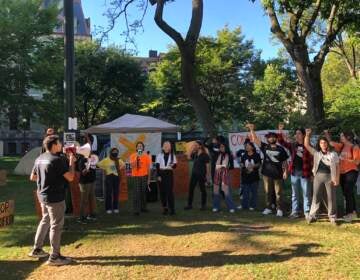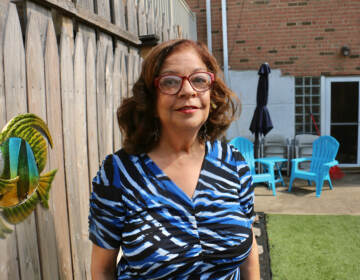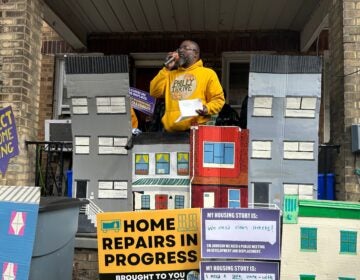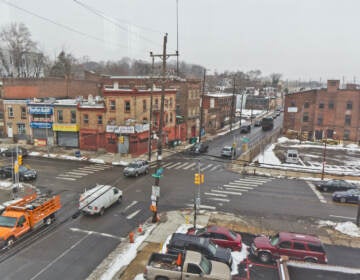Ever wondered if the soil in your Philly yard has lead in it? Now’s your chance to find out
Got questions about keeping your kids safe from lead? This event in West Philly Saturday will have all the answers — and free smoothies!

Sunflowers tower over a People's Kitchen garden at 61st and Reinhard streets in Southwest Philadelphia. (Emma Lee/WHYY)
Got questions about lead? You’ll find answers at an event hosted by the Overbrook Environmental Education Center in West Philadelphia Saturday.
The event will have free, on-the-spot soil testing, workshops with experts to answer questions about lead in water, soil, and paint — and information about how to protect your family.
“It’s one of those preventable polluters that we need to work hard to try to get out of our community,” said Jerome Shabazz, executive director of the Overbrook Environmental Education Center.
Representatives will be on hand from the EPA, the Philadelphia Water Department, the Philadelphia Department of Public Health, and several local universities.
“If you really want to get deep into the issue and ask questions, you can have direct access to the professionals,” Shabazz said.
There will also be free fruit smoothies and apple cider.
Why is lead dangerous?
Lead is a neurotoxin that can affect brain development. Exposure to high levels can cause symptoms such as coma and convulsion. But exposure often has no immediate, visible signs.
Children under the age of 6 are especially vulnerable. Lead can hurt their brains and nervous systems, slow their growth, and disrupt learning and behavior, according to the U.S. Centers for Disease Control and Prevention (CDC).
Where can you be exposed?
People can come into contact with lead through a number of pathways. A few common sources are lead paint, lead in drinking water, and lead in soil.
Lead-based paints were banned for use in homes in 1978, so homes built before then often contain lead paint — which can chip and create lead dust. According to the CDC, the vast majority of homes in Philly could contain lead paint based on when they were built. Young kids can easily be exposed to lead dust, because they tend to put things in their mouths. The city of Philadelphia requires landlords renting out units built before 1978 to certify that their property is lead-free or lead-safe in order to obtain a rental license or execute a lease.
The pipes that connect homes to the city-owned water mains, known as service lines, can also be made of lead. But the city uses corrosion control treatment to prevent water from picking up lead from pipes. Philadelphia Water Department said its drinking water passes federal standards for the percent of high-risk homes where water can exceed a lead action level. Two of the 99 homes with lead service lines where PWD tested tap water in 2019 exceeded the federal standard.
People can also be exposed to lead in soil, often from past industry, lead paint on the outsides of buildings, or leaded gasoline. A 2017 investigation by the Philadelphia Inquirer found hazardous levels of lead in exposed soil at many sites in the fast-developing river ward neighborhoods.
Who’s affected by lead in Philly?
Kids across the city are affected by lead, but the highest rates of lead exposure are in low-income neighborhoods and neighborhoods with older housing stock, according to the Philadelphia Department of Public Health’s latest community health assessment.
In 2018, areas of North Philly and West Philly had the greatest percent of newly identified young children with venous blood lead levels of at least 5 µg/dL — at the time a CDC reference level for high blood lead levels, which has since been revised downward.
Resources for lead testing and remediation
City health centers offer free blood lead testing for kids. Lead testing is also available through other health care providers. City officials reach out to families of children with the highest blood lead levels, to offer resources such as free home lead testing and help removing the source of the lead, for those who qualify based on income, family size, and the severity of the problem.
If you’re concerned about lead in your drinking water, you can get your water quality tested for free through the Philadelphia Water Department.
Eligible PWD customers can get zero-interest loans to replace lead service lines. PWD will replace lead service lines for free when the utility is already replacing the water main on the block.
There are plenty of resources online to learn more about lead exposure risks and how to protect your family.
How to collect soil for free lead testing this weekend
The event at the Overbrook Environmental Education Center Saturday will have free, on-the-spot soil analysis, to help you find out if the dirt in your yard or garden could be exposing you and your kids to lead.
Collect the soil samples ahead of time, and follow this procedure from the organizers of the event:
- Choose the places you want to sample (for example, a garden, a front yard, or a playground area).
- Collect several soil samples from each area (6 inches deep for gardens, 2 inches deep for other areas), totaling at least two cups.
- Combine the samples within each area and mix well, removing rocks and sticks (for example, mix all front yard samples together but keep these separate from the playground samples).
- Dry the samples in the sun or in big paper bags.
- Bring the samples to Saturday’s event in clear plastic bags with labels.
The Healthy Soil, Health Home, Healthy Life event is 10 a.m. – 3 p.m. Oct. 8 at the Overbrook Environmental Education Center at 6134 Lancaster Ave, Philadelphia, PA 19151

Subscribe to PlanPhilly
WHYY is your source for fact-based, in-depth journalism and information. As a nonprofit organization, we rely on financial support from readers like you. Please give today.









